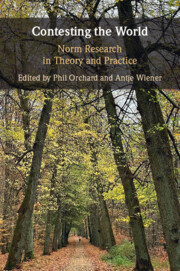Book contents
- Contesting the World
- Contesting the World
- Copyright page
- Contents
- Figures
- Tables
- Contributors
- Acknowledgements
- Abbreviations
- 1 Introduction
- Part I Norm Strength, Collisions, and Conflicts
- Part II Development of the Field
- Part III Meta-theorising, Linkages, and International Law
- Part IV Dimensions of Norm Contestation
- 12 Of Norms and Networks
- 13 Regulatory Contestation and the Creation of Transnational Legal Orders
- 14 Norms, Normativity, and Pragmatist Justification
- 15 Social in Practice, Contested in Principle
- References
- Index
15 - Social in Practice, Contested in Principle
Future Norm Research
from Part IV - Dimensions of Norm Contestation
Published online by Cambridge University Press: 01 November 2024
- Contesting the World
- Contesting the World
- Copyright page
- Contents
- Figures
- Tables
- Contributors
- Acknowledgements
- Abbreviations
- 1 Introduction
- Part I Norm Strength, Collisions, and Conflicts
- Part II Development of the Field
- Part III Meta-theorising, Linkages, and International Law
- Part IV Dimensions of Norm Contestation
- 12 Of Norms and Networks
- 13 Regulatory Contestation and the Creation of Transnational Legal Orders
- 14 Norms, Normativity, and Pragmatist Justification
- 15 Social in Practice, Contested in Principle
- References
- Index
Summary
Over the past two decades, we have seen a significant shift in the norms literature away from the idea that a norm reflects a fixed and universally accepted shared understanding to notions that any norm – even those which appear to be widely institutionalised in international organisations of global governance – remains subject to contestation and interpretation at multiple sites in world politics. In this chapter, we take up the challenge of studying these diverse types of norms and their meaning, use, and role in practice. We begin by returning to the three moves laid out in the introduction and use as a vignette the forced landing of Ryanair Flight 4978 in Belarus in May 2021 to explore how each of these three moves can explain these events. We then draw out three sets of conclusions from the book, focusing on the process of contestation. We end by noting that the distinct approaches to norm research developed over the past thirty years do speak to one another in meaningful and innovative ways. By focusing on contestation in a holistic way, we can not only understand norms in a unique way but also how they constitute the world.
- Type
- Chapter
- Information
- Contesting the WorldNorm Research in Theory and Practice, pp. 252 - 274Publisher: Cambridge University PressPrint publication year: 2024
- 1
- Cited by

